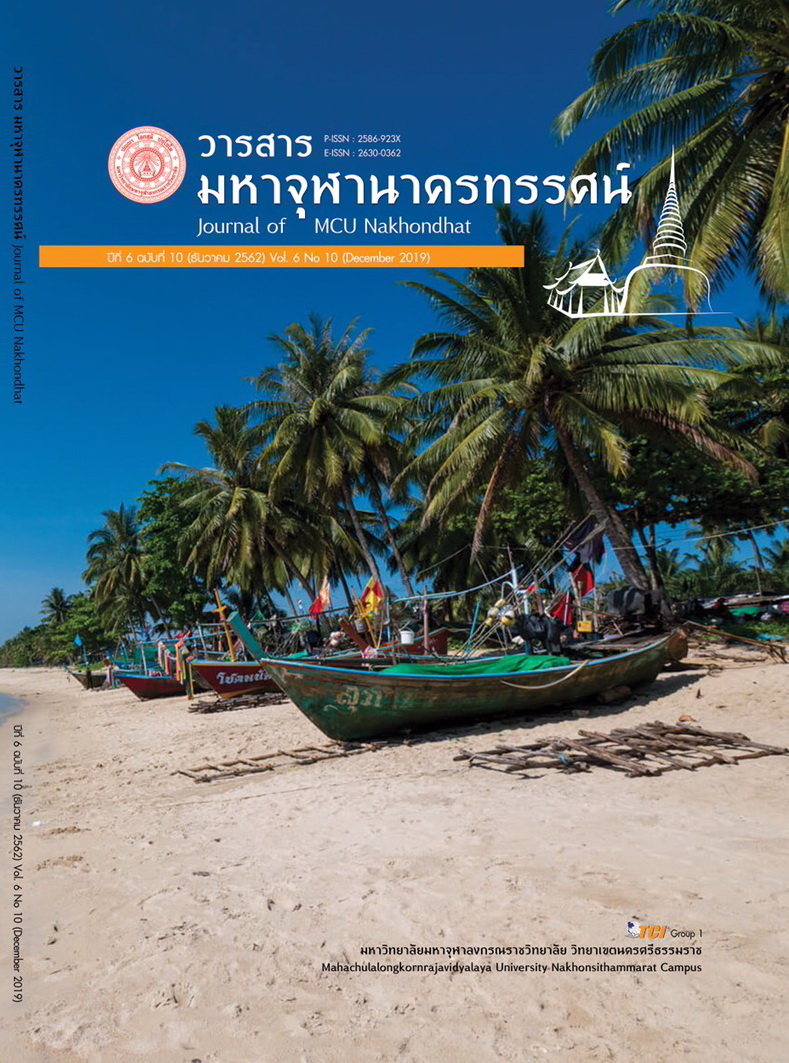THE PROMOTION OF THE QUALITY OF LIFE OF THE ELDERLY HANDICAPPED
Main Article Content
Abstract
This research article includes purposes as follows; 1) to study the measures of the quality of life promotion of the elderly handicapped in the perspectives of state agencies, private agencies or general non-government organization (NGO) and specific organization or stakeholder organization, 2) to study problems, obstacles, and suggestions for the quality of life promotion of the elderly handicapped based on state agencies, private agencies or general non-government organization (NGO) and specific organization or stakeholder organization, and 3) to compare the operations based on the policies of state agencies, private agencies or general non-government organization (NGO) and specific organization or stakeholder organization. Samples of this qualitative research include 13 key-informants comprising of 4 administrators and 1 academician from state agencies relating to the elderly handicapped, 2 from private agencies or general NGO, 1 from specific organization or stakeholder organization, and 5 elderly handicapped. The in-depth interview is used as a research tool with triangulation method for data verification in which data analysis includes the recheck review with the previous informants to verify the accuracy. Moreover, the data synthesis is conducted in the descriptive data collection to find out the differences by means of interpretation and translation, and the main points are processed and summed up in total before the findings are presented based on the research purposes.
The research results are as follows:
- The measures of the quality of life promotion of the elderly handicapped include the measures concerning the follow-up of the operation of setting up the quality of life standard to support the power of the elderly handicapped to create the equality in the social with indicators relating to the elderly handicapped ‘s homes. The measures also relate to the provision of welfare, housing, facilities, living conditions, careers, training, education and the support with the improvement of the elderly handicapped ‘s living conditions by the department of strategy and planning. In terms of the measures concerning the support and improvement of the quality of life and the community and social service, the life-long free use of BTS is available for the elderly handicapped with the help of the staff including the radio call service from the pick-up point to the destination by the staff at the stations. The travel by BTS is, therefore, safe and reliable all the way to the destination.
- Problems, obstacles and suggestions for the promotion of the elderly handicapped ‘s quality of life are as follows; 1) the problems relating to the attitudes of the elderly handicapped own’s family, 2) the problems concerning laws, regulations, and the lack of official documents approved of the operation with the elderly handicapped, and 3) problems of the integration of the cooperation among working units under state and private agencies and stakeholder organization.
3. The results of comparing the operation based on the policies of state and private agencies, general NGO and specific organization or stakeholder organization point out the serious implementation of the policies supporting and improving the quality of life of the elderly handicapped by the mentioned 3 sectors for concrete success. However, limitation of some operation exists. In terms of state agencies, the limitation relates to the creation of social aptitude concerning the care of the elderly handicapped or the peaceful coexistence in the societies without depriving of and discriminating the elderly handicapped. In terms of private agencies or general NGO, namely BTS, the limitation includes the provision of facilities for the elderly handicapped. For example, the problems of limit space in the elevator result in the capacity crowd of the handicapped ‘s wheel chairs, and the electricity poles and footpath cause the inability to provide more elevators. In terms of specific organization or stakeholder organization, the problems relate to the provision of facilities by state agencies, namely wheel chairs, does not serve the elderly handicapped ‘s needs
Article Details
References
กิตติ ชุณหศรีวงศ์. (2559). ปัจจัยที่มีอิทธิพลต่อคุณภาพชีวิตในการทำงานของพนักงานในธุรกิจขนาดกลางและขนาดย่อม. ใน ดุษฎีนิพนธ์ปรัชญาดุษฎีบัณฑิต สาขาวิชาการพัฒนาทรัพยากรมนุษย์. มหาวิทยาลัยรามคำแหง.
จิรโชค วีระสย. (2555). สังคมวิทยาการเมือง. กรุงเทพมหานคร: สำนักพิมพ์มหาวิทยาลัยรามคำแหง.
นิติพัฒน์ กิตติรักษกุล. (2559). ความสัมพันธ์เชิงสาเหตุของคุณภาพชีวิตการทำงานของข้าราชการตำรวจ สำนักงานตำรวจแห่งชาติ. ใน ดุษฎีนิพนธ์ปรัชญาดุษฎีบัณฑิต สาขาวิชารัฐศาสตร์. กรุงเทพมหานคร: มหาวิทยาลัยรามคำแหง.
ราชกิจจานุเบกษา. (2556). พระราชบัญญัติส่งเสริมและพัฒนาคุณภาพชีวิตคนพิการ พ.ศ. 2550 และที่แก้ไขเพิ่มเติม (ฉบับที่ 2 ) พ.ศ. 2556 (ฉบับอ้างอิง ปรับปรุงครั้งที่ 13) เล่ม 130 ตอนที่ 30 ก. กรุงเทพมหานคร: โรงพิมพ์สำนักงานพระพุทธศาสนาแห่งชาติ.
สุภาพ ชุมรัมย์. (2556). การนำนโยบายว่าด้วยการส่งเสริมและพัฒนาคุณภาพชีวิตคนพิการไปสู่การปฏิบัติในประเทศไทย. ใน ดุษฎีนิพนธ์ปรัชญาดุษฎีบัณฑิต สาขาวิชารัฐศาสตร์. กรุงเทพมหานคร: มหาวิทยาลัยรามคำแหง.
Ministry of Community Development, Youth and Sports. (2008). Sporting culture committee report. Singapore: Author.
Nussbaum, M., & Sen, A. (Eds.). (1993). The quality of life. Oxford, England: Clarendon Press.
World Health Organization (WHO). (1980). International classification of impairment disabilities and handicaps. Geneva, Switzerland: Author.


